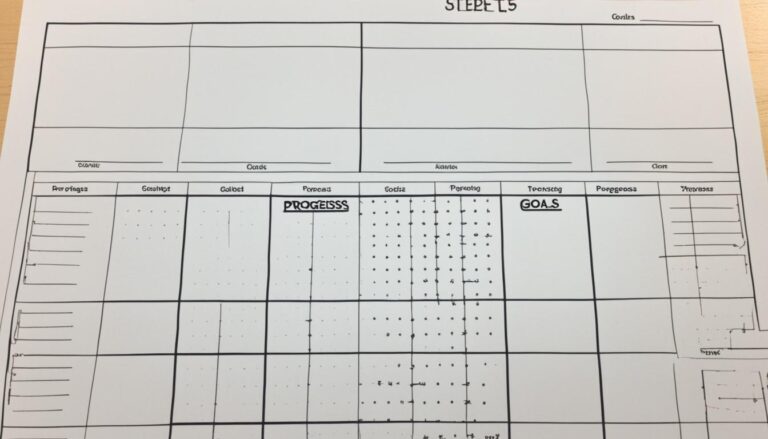Achieve More with Goal Setting in Time Management

“The key is not to prioritize what’s on your schedule, but to schedule your priorities.” – Stephen Covey
Goal setting and time management are interconnected and essential skills for personal and professional success. By setting clear goals and managing time effectively, you can increase productivity, reduce stress, and achieve your objectives. Clarity of purpose, prioritization, focus and productivity, motivation and accountability, overcoming procrastination, measurement and adjustment, stress reduction, consistency, and long-term vision are all benefits of combining goal setting with time management.
Key Takeaways
- Clarity of purpose provides the direction and structure needed to set and achieve your goals.
- Prioritization helps you balance immediate tasks with long-term goals, ensuring that you focus on what truly matters.
- Setting SMART goals enhances focus and productivity, allowing you to make steady progress.
- Time management creates accountability, maintaining motivation and consistency in working towards your objectives.
- Effective time management strategies such as the Pomodoro Technique and time blocking can help you overcome procrastination.
Clarity of Purpose
Clear and well-defined goals give direction and purpose to your actions. When you have a clear vision of what you want to achieve, it becomes easier to make decisions and take the necessary steps to reach your desired outcome. This is where clarity of purpose comes into play.
Time management plays a crucial role in bringing structure to the goal-setting process. It helps you allocate time and resources to specific goals, ensuring that you have a focused approach to achieving them. By organizing your time effectively, you are able to prioritize the tasks and activities that align with your goals, making them more achievable and manageable.
Defining Goals
Defining your goals is the first step towards achieving them. It involves identifying what you want to accomplish and setting clear objectives. By doing so, you create a roadmap that outlines the milestones you need to reach in order to turn your ambitions into reality.
Time management brings structure to the goal-setting process by providing a framework for planning and organizing your tasks. It allows you to break down your goals into smaller, actionable steps, making them more attainable. By allocating specific time slots to work on each task, you ensure that you are consistently making progress towards your goals.

Having a visual representation of your goals and the time allocated to each task can be incredibly motivating. It gives you a sense of purpose and accountability, as you can see the progress you are making towards achieving your goals.
| Benefits of Clarity of Purpose | Benefits of Time Management |
|---|---|
|
|
By combining clarity of purpose with effective time management, you create a powerful framework for achieving your goals. This synergy allows you to stay focused, motivated, and accountable, ultimately leading to greater success and fulfillment in both your personal and professional life.
Prioritization
In a fast-paced world filled with distractions and demands, prioritization is crucial to focus on what truly matters. By setting goals, you can identify and prioritize your most important aspirations, aligning your actions with your values and long-term vision. However, managing time effectively is equally essential to strike a balance between immediate tasks and long-term goals.
When it comes to prioritization, time management plays a crucial role in maximizing your productivity and allocating your resources efficiently. By effectively managing your time, you can dedicate more energy and attention to your important objectives, ensuring they receive the focus they deserve.
So, how can you prioritize your goals and manage your time effectively? Here are a few strategies to help you ensure that your efforts are directed towards what truly matters:
- Start by setting clear and specific goals. Define what you want to achieve and establish the desired outcome. This clarity of purpose will guide your decision-making process when prioritizing tasks.
- Assess the urgency and importance of each task or goal. Prioritize based on the impact it will have on your overall objectives and the timeframe within which it needs to be completed. This will help you determine the level of priority each item deserves.
- Break down large goals into smaller, manageable tasks. By breaking your goals into actionable steps, you can tackle them more efficiently. This approach allows you to make progress consistently and eliminates overwhelm.
- Consider using productivity techniques such as the Eisenhower Matrix, which categorizes tasks into four quadrants based on their urgency and importance. This method helps you prioritize tasks effectively and make informed decisions about where to dedicate your time and energy.
- Regularly review and reassess your priorities. As circumstances change, it’s important to adapt and adjust your priorities accordingly. This flexibility ensures that you stay aligned with your goals.
| Prioritization Strategies | Description |
|---|---|
| Set clear goals | Define specific goals to establish a clear direction. |
| Assess urgency and importance | Evaluate tasks based on their impact and time sensitivity. |
| Break down goals | Divide large goals into smaller, manageable tasks. |
| Utilize productivity techniques | Implement methods like the Eisenhower Matrix to prioritize effectively. |
| Regularly review and reassess | Stay flexible and adjust priorities as needed. |
Remember, effective prioritization and time management are essential not only for achieving your goals but also for maintaining a healthy work-life balance. By dedicating your time and energy to what matters most, you can make progress towards your aspirations while avoiding burnout.
Focus and Productivity
When it comes to achieving your goals, focus and productivity are key. By setting SMART goals (specific, measurable, achievable, relevant, and time-bound), you can enhance your ability to stay focused and make steady progress. But it’s not just about goal setting; effective time management techniques can also significantly boost your productivity.
One popular time management technique is the Pomodoro Technique, where you work in focused bursts, typically 25 minutes, followed by a short break. This helps prevent burnout and ensures that your energy and attention are maximized during your work sessions. The Pomodoro Technique allows you to break down large tasks into smaller, more manageable chunks, making it easier to maintain focus and productivity throughout the day.
Another effective technique is time blocking, which involves scheduling specific blocks of time for different tasks or activities. By allocating dedicated time slots for various activities, you can eliminate distractions and create a structured environment that promotes productivity. Time blocking allows you to prioritize your most important tasks and ensure that they receive the attention they deserve. It helps keep you on track and prevents you from getting overwhelmed by competing priorities.

Implementing these time management techniques will help you stay focused, maintain high productivity levels, and make significant progress towards your goals. Remember, it’s not just about working harder; it’s about working smarter by managing your time effectively.
Benefits of SMART Goals, Focus, and Productivity:
- Increased efficiency and output
- Improved time management skills
- Reduced stress and overwhelm
- Better task prioritization
- Enhanced motivation and momentum
- Greater sense of accomplishment
| SMART Goals | Focus | Productivity |
|---|---|---|
| Help you define clear objectives and track progress | Keeps you aligned with your goals and minimizes distractions | Allows you to maximize output and achieve more in less time |
| Provides a framework for effective goal setting | Helps you concentrate on important tasks and avoid multitasking | Enables you to prioritize tasks and meet deadlines efficiently |
| Creates a sense of purpose and direction | Improves your ability to stay present and fully engage in your work | Enhances your ability to manage your workload and avoid overwhelm |
Motivation and Accountability
Achieving ambitious goals requires motivation and dedication. While motivation alone may fade over time, time management creates accountability. By dedicating time to goals, you commit to achieving them, which helps maintain motivation and consistency in working towards objectives.

Stay Motivated and Accountable
To stay motivated and accountable, follow these tips:
- Set clear and measurable goals: Define what you want to achieve and break it down into smaller milestones.
- Create a schedule: Allocate dedicated time for working towards your goals. Stick to your schedule and treat it as a commitment to yourself.
- Track progress: Regularly assess your progress and celebrate small victories along the way.
- Find inspiration: Surround yourself with motivational quotes, success stories, or role models who inspire you to stay dedicated.
- Establish a support system: Share your goals with trusted friends or family members who can provide encouragement and hold you accountable.
By consistently practicing these habits, you can maintain your motivation and accountability while effectively managing your time.
| Benefits of Motivation and Accountability in Time Management | Description |
|---|---|
| Increase productivity | When you’re motivated and accountable, you’re more likely to complete tasks efficiently and make the most of your time. |
| Enhance focus | With clear goals and accountability, you can better prioritize your tasks and stay focused on what truly matters. |
| Build perseverance | Motivation and accountability help you develop the resilience needed to overcome challenges and setbacks along the way. |
| Boost self-confidence | Successfully achieving your goals through dedication and accountability boosts your confidence and belief in your abilities. |
By combining motivation, dedication, and accountability with effective time management strategies, you can unlock your full potential and accomplish remarkable results.
Overcoming Procrastination
Procrastination is a common hurdle that hinders progress towards our goals. Thankfully, there are effective time management strategies that can help us overcome this challenge and stay focused. Two powerful techniques that can break the cycle of procrastination are the Pomodoro Technique and time blocking.
The Pomodoro Technique involves working in focused bursts of time, typically 25 minutes, followed by short breaks. This method helps us maintain concentration and productivity by breaking tasks into manageable intervals. By setting a timer and committing to this structured approach, we can combat the urge to procrastinate and make steady progress.
Time blocking is another valuable strategy for overcoming procrastination. It involves scheduling specific blocks of time for different tasks or activities. By allocating dedicated time slots to important tasks and setting clear priorities, we create a sense of accountability and eliminate room for delay. With time blocking, we create a structured roadmap that guides us towards completing our goals efficiently.
By implementing these time management strategies, we carve out focused periods for work while also incorporating breaks for rejuvenation. This balance between dedicated work and rest reduces the likelihood of procrastination and enhances our productivity. It allows us to tackle our goals with renewed energy and determination.
Remember, the key to overcoming procrastination lies in managing your time effectively through techniques like the Pomodoro Technique and time blocking. By adopting these strategies, you can stay on track, defeat procrastination, and make significant strides towards achieving your goals.

| Procrastination Consequences | Benefits of Time Management Strategies |
|---|---|
|
|
Measurement and Adjustment
Setting goals is the first step towards achieving success. However, it doesn’t stop there. To effectively track progress and ensure that you’re on the right path, measurement and adjustment are crucial elements of the goal-setting process.
By regularly measuring your progress, you gain valuable insights into how far you’ve come and what still needs to be done. This measurement allows you to make informed decisions and adjustments along the way, increasing the likelihood of achieving your goals.
Tracking progress enables you to identify any areas where you may be falling short or encountering obstacles. It provides an opportunity to evaluate your strategies and determine if they need refinement or if you need to explore alternative approaches. Adjusting your approach based on these evaluations allows you to stay aligned with your goals and make the necessary changes to ensure success.
Measurement and adjustment help you stay accountable to your goals. They provide a feedback loop that keeps you engaged and motivated, as you can see your progress and make the necessary tweaks to stay on track.
Remember, goal setting is not a one-time event. It is an iterative process that requires continuous measurement and adjustment to ensure that you are always progressing towards your aspirations.
To help you visualize the importance of measurement and adjustment in goal setting, consider the following table:
| Goal | Initial Plan | Measured Progress | Adjustment |
|---|---|---|---|
| Complete a marathon | Run 3 times a week, increasing distance gradually | Completed 5-mile runs consistently, but struggling beyond | Consulted a running coach, adjusted training plan to focus on endurance |
| Write a novel | Write for 2 hours every day | Made progress in the first month, then started experiencing writer’s block | Sought inspiration from other writers, adjusted writing routine to include freewriting exercises |
| Launch a successful business | Create a detailed business plan and secure funding | Business plan finalized, but struggled to secure funding | Explored alternative funding options and refined business plan to attract investors |
As you can see from the table, measurement and adjustment allow individuals to stay adaptable and responsive to their goals. This iterative process ensures continuous improvement and maximizes the chances of achieving success.
Conclusion
Goal setting and time management go hand in hand when it comes to achieving success in both your personal and professional life. By combining these two essential skills, you can unlock a multitude of benefits that will propel you towards your goals and enhance your overall productivity.
When you set clear goals and effectively manage your time, you gain clarity of purpose. You transform vague aspirations into concrete plans, bringing structure to your ambitions and making them more attainable.
By prioritizing your goals and balancing your tasks, you allocate your time and resources to what truly matters, ensuring that important objectives receive the attention they deserve. Additionally, implementing time management techniques, like the Pomodoro Technique and time blocking, helps you stay focused and boosts your productivity.
Furthermore, goal setting combined with time management provides you with motivation and accountability. Dedicat






